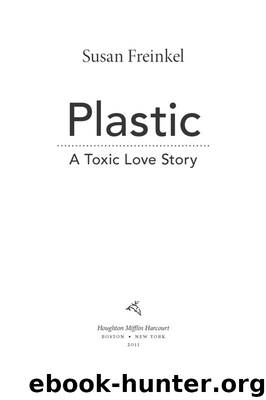Plastic by Susan Freinkel

Author:Susan Freinkel [Freinkel, Susan]
Language: eng
Format: epub
Publisher: Houghton Mifflin Harcourt
Roger Bernstein of the American Chemistry Council has understood that all along. He recognizes that the plastic-versus-paper fights are sideshows; the real threat to the industry is the battle against single-use products, the drive to replace disposables with reusables. The push for bans and fees are being driven by "a pure expression of the zero-waste ethic, and total non-choice about reusable bags is the end game," he said disdainfully. "Everything needs to be reused!" Bernstein is vice president for state and legislative affairs for the ACC, which has increasingly taken on the role of chief lobbyist for the plastic bag. I met with him and other ACC representatives at their headquarters in Arlington, Virginia, shortly before the group moved to a new state-of-the-art-green, LEED-certified building closer to Capitol Hill.
Bernstein, in his sixties, is a slight, sharp-featured man with a thick thatch of gray hair and brown eyes magnified behind his glasses. He's been a backroom warrior for the industry for more than thirty years. A former journalist, he started at the Society of the Plastics Industry, then moved to the American Plastics Council, a group formed by major resin makers in the late 1980s, and then joined the ACC when it merged with the Plastics Council in 2000. The ACC had kept its distance from the bag battle, but it took up the fight in early 2008 when the bag makers became overwhelmed by the blizzard of anti-bag measures. The ACC clearly hoped to prevent the furor over bags from snowballing into broader anti-plastics initiatives.
Bernstein divides the politics of plastic into "fear issues" and "guilt issues." Fear issues, he said, are the ones concerned with "environmental self-protection" or with safety questions such as the debate over the potential health risks of bisphenol A. "You have to address those with all the information you can bring to bear on [the chemical's] safety," ideally from third-party sources that will be considered more credible than the industry itself. To that end, the industry has sponsored research studies on suspect chemicals, studies that have a striking tendency to produce results showing the chemicals in question are safe far more often than those conducted by independent researchers do. Bernstein called it delivering information; critics called it sowing doubt.
Plastic bags don't arouse fear, but, as Bernstein recognized, they do play on people's sense of guilt about consumption and the wastefulness of throwaway products. The answer to that is to give people ways to feel all right about single-use plastic products. That means public relations campaigns to remind people about the benefits of plastics and industry-sponsored bills and programs that promote recycling, which he called "a guilt eraser." Recycling assures people that plastic isn't just an infernal hanger-on; it has a useful afterlife. "As soon as they recycle your product," he explained, "they feel better about it." Then they don't want to ban it.
Bernstein learned the methods of guilt assuagement in the late 1980s during an earlier public outcry over plastics packaging. Fears about shrinking landfill space
Download
This site does not store any files on its server. We only index and link to content provided by other sites. Please contact the content providers to delete copyright contents if any and email us, we'll remove relevant links or contents immediately.
Man-made Catastrophes and Risk Information Concealment by Dmitry Chernov & Didier Sornette(6011)
The Revenge of Geography: What the Map Tells Us About Coming Conflicts and the Battle Against Fate by Kaplan Robert D(4076)
Zero Waste Home by Bea Johnson(3835)
COSMOS by Carl Sagan(3618)
Good by S. Walden(3549)
In a Sunburned Country by Bill Bryson(3537)
The Fate of Rome: Climate, Disease, and the End of an Empire (The Princeton History of the Ancient World) by Kyle Harper(3062)
A Wilder Time by William E. Glassley(2859)
Camino Island by John Grisham(2797)
Organic Mushroom Farming and Mycoremediation by Tradd Cotter(2689)
The Ogre by Doug Scott(2679)
Human Dynamics Research in Smart and Connected Communities by Shih-Lung Shaw & Daniel Sui(2500)
Energy Myths and Realities by Vaclav Smil(2488)
The Traveler's Gift by Andy Andrews(2460)
9781803241661-PYTHON FOR ARCGIS PRO by Unknown(2365)
Inside the Middle East by Avi Melamed(2352)
Birds of New Guinea by Pratt Thane K.; Beehler Bruce M.; Anderton John C(2254)
A History of Warfare by John Keegan(2240)
And the Band Played On by Randy Shilts(2200)
